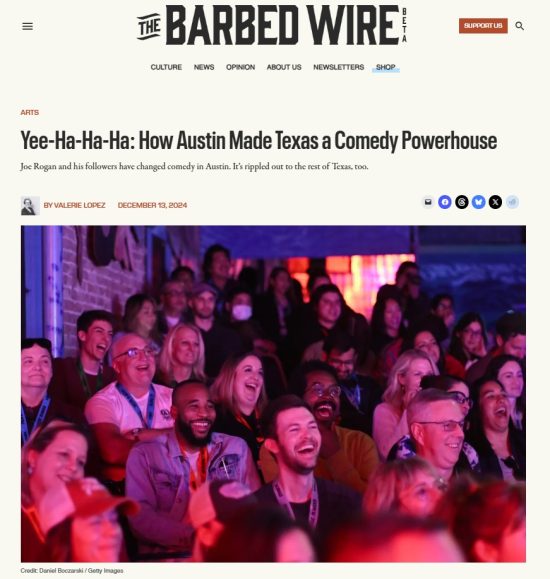Yee-Ha-Ha-Ha: How Austin Made Texas a Comedy Powerhouse
Joe Rogan and his followers have changed comedy in Austin. It’s rippled out to the rest of Texas, too.
By Valerie Lopez, Friday December 13, 2024

On a mild September Friday night in Spicewood, hundreds of Hill Country residents flocked to Angel’s Icehouse’s first-ever comedy night. Headliner Darius Bennett stepped onto the outdoor stage of the venue, which is known for its spectacular views, live music, and, on this night, lots of kids. Much to his surprise, Bennett, a regular at Joe Rogan’s Comedy Mothership, was joined on stage by children oblivious to the imaginary boundary between his performance space and the nearby playscape.
Bennett did his best to self-censor but found himself defenseless against a lively cricket population providing unwanted backing vocals. This is not the Comedy Cellar in New York City or Los Angeles’ Comedy Store. This is comedy in Texas, 2024 edition.
How Austin Became Comedy’s Third Coast
Over the last five years, the business of comedy in Texas has changed dramatically. Before the pandemic, comics in Texas dreamed of getting a late-night spot on Jimmy Fallon, Jimmy Kimmel, or Conan O’Brien. If you were ready to leave Austin for more national exposure, you were asked, “Are you moving to Los Angeles or New York?” These days, the question is more likely to be, “Have you done Kill Tony?”
Los Angeles and New York comics facing strict lockdowns in 2020 started eyeing Texas for its low taxes, ample outdoor space, affordable real estate, lax COVID restrictions, and business-friendly policies. The siren call came when Joe Rogan moved from California to Austin in 2020 and announced plans to open a comedy club modeled after LA’s Comedy Store. Soon after, Tony Hinchcliffe brought his wildly successful Kill Tony live show (an elaborate open mic with celebrity guests and backing band) to 6th Street’s Vulcan Gas Company before moving to Rogan’s new Texas-based playground.
The influx of comics between 2020 and 2022 created a boom so undeniable I labeled Austin as the “third coast of comedy” in the Los Angeles Times last June. Austin still may not be LA or New York, but, as we approach 2025, there’s more buzz than ever.
The Mothership Has Landed
When Comedy Mothership opened last year at the historic downtown Ritz Theater, comedy became the reason for fans from all over the world to visit Austin. Shows sold out months in advance. Ron White, Whitney Cummings, Roseanne Barr, and other nationally recognized comics flocked to perform on its two stages: Fat Man and Little Boy. This translates to about 340 comedy fans every night of the week spending money to see their favorite comic — or in hopes of a big name drop-in. The famous comics who drop in might have their own headlining shows at the nearby Paramount Theatre, meaning the economic impact to Austin extends beyond the Mothership.
Meanwhile, aspiring comics dream of getting their name pulled from the “Bucket of Destiny” to perform a 60-second set for Kill Tony’s regular live audience, which includes not only those at Comedy Mothership but the two to three million viewers who watch the recorded live stream on Youtube. Performers say they appreciate the lengths Rogan went to create a training ground for comics. “Every detail of the show rooms from the seating to acoustics has been designed with comedians in mind,” said frequent Mothership performer and LA transplant Sam Lopez “It’s the hottest club in America so audiences travel from everywhere to be there.”
Does it work? After moving from Idaho, Casey Rocket, a Mothership door guy, combined his work ethic with a willingness to perform on any stage in Austin and has accumulated a rabid fandom along the way. He now headlines clubs all over the country.
When Comedy Worlds Collide
Still, the opening of Mothership has not been without controversy.
Austin has found itself at the center of the woke vs anti-woke comedy debate. In 2021, during a performance at the height of the pandemic, Hinchcliffe was recorded using a racial slur toward an Asian comic. For a time, you were either with or against Tony. The comic bounced back, but during a now-infamous Trump presidential rally at Madison Square Garden, Hinchcliffe disparaged underrepresented communities, including Puerto Ricans, whose home he referred to as a “floating island of garbage.” Because the rally occurred mere days before an historically contentious election, Hinchcliffe was the subject of pundit analysis, reporting, and opinion content at nearly every news outlet and website on the planet. Austin’s role in encouraging or even celebrating Hinchcliffe’s brand of punch-down comedy is one we continue to grapple with.
Rogan’s new club came to town while Austin was in a bit of a comedy vacuum. During the height of the pandemic, established comics and long-standing venues like Cap City Comedy Club and The Velveeta Room took sheltering seriously to limit the spread of COVID. Cap eventually closed and would reopen under new management in a different location.
With limited understanding that Austin was politically a blue dot in a red state, newcomers flocking to Austin figured Gov. Greg Abbott and his anti-mask, anti-safety measures represented the city. The disconnect created a culture war that took time to resolve. Hints of it remain.
A Rising Tide
The boom in Austin meant the opening of several new comedy clubs, and the city now has as many as 100 comedy shows per week. The ripple effect reverberated across the state. Houston, Dallas, and San Antonio had long-established comedy bona fides, and the abundance of comics in Austin now meant savvy venues in those cities could lure Austin comics to perform on their stages.
Brian Gendron, founder of Houston’s The Riot Comedy Club and Riot Fest Comedy Festival has observed that “the careers of some Houston comedians get a boost from making trips to Austin venues, making our (Houston) talent pool better,” he told The Barbed Wire.
Comedian Bridget Tooley, of McKinney, added, “The growth of the Austin scene has definitely impacted the DFW scene in both good and bad ways. It has been good for us because it brought a lot of great talent and attention to comedy in Texas, and as they say, a rising tide lifts all boats.” The downside, however, is that a talent vacuum occurs when a city’s best comics pack their bags for Austin.
Tales from Across the State
Other cities are trying with varying degrees of success to mimic the Austin formula. Despite its steady population growth, Waco’s comedy scene has struggled to gain a foothold. In 2021, two comedy clubs closed within a few months of each other, effectively ending the typical pipeline from an open mic to a comedy club.
On the other hand, in Killeen, a tight-knit group of comics has succeeded in keeping comedy thriving even in the face of club closures.
As for the rest of the state, Texas added a Big Laugh Comedy Club in downtown Fort Worth this year, and the Chuko Town Comedy Festival launched in El Paso. Both have roots in Austin. Big Laugh’s first club was in Austin, and Chuko Town Festival’s founder spent ten years in Austin learning about comedy by going to Cap City and the Moontower Comedy Festival.
The Texas Comedy Brand
It’s not just the rapid growth of comedy that sets Texas apart, but the diversity of voices finding success in our state. From Ralph Barbosa’s slow, deliberate wording to Casey Rocket’s high-energy hilarity, to Vanessa Gonzalez’s tales of family and growing up in Laredo, Texas comedy is as diverse as our geography.
Could it be that, nowadays, everything’s funnier in Texas, too?
Valerie Lopez is a writer, executive producer, editor, and podcaster for comedywham.com based in Austin, covering comedy in Texas. She's interviewed hundreds of comedians based in or passing through Texas. Her work has appeared in the Austin Chronicle, The Texas Standard, and the Los Angeles Times.comedywham.com.
Follow @ComedyWham on Instagram, Facebook, Youtube, Twitch, and Tiktok
If you’d like to support our independent podcast, check out our Patreon page at: Patreon.com/comedywham . You can also support us on Venmo or Paypal — just search for ComedyWham.

Valerie Lopez

